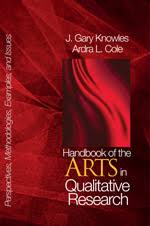Handbook of the Arts in Qualitative Research – J. Gary Knowles & Ardra L. Cole

Editor(s): J. Gary Knowles & Ardra L. Cole
Publisher: SAGE Publications, Inc
Year of Publication: 2007
Print Length: 720 pages
Genre: Arts-Based Method, Non-Fiction / Arts & Humanities, Non-Fiction / Social Science
Topic: Media & Narratives, Qualitative Research, Research, Research Methods, Visual
The Handbook of the Arts in Qualitative Inquiry: Perspectives, Methodologies, Examples, and Issues represents an unfolding and expanding orientation to qualitative social science research that draws inspiration, concepts, processes, and representational forms from the arts.
In this defining work, J. Gary Knowles and Ardra L. Cole bring together the top scholars in qualitative methods to provide a comprehensive overview of the past, present, and future of arts-based research. This Handbook provides an accessible and stimulating collection of theoretical arguments and illustrative examples that delineate the role of the arts in qualitative social science research.
Table of Contents
Preface
Acknowledgments
PART I: KNOWING
Chapter 1. Art and Knowledge – Elliot Eisner
Chapter 2. The Art of Indigenous Knowledge: A Million Porcupines Crying in the Dark – Thomas King
PART II: METHODOLOGIES
Chapter 3. Art-Based Research – Shaun McNiff
Chapter 4. Visual Images in Research – Sandra Weber
Chapter 5. Arts-Informed Research – Ardra L. Cole and J. Gary Knowles
Chapter 6. Arts-Based Research – Susan Finley
Chapter 7. A/R/Tographers and Living Inquiry – Stephanie Springgay, Rita L. Irwin, and Sylvia Kind
Chapter 8. Lyric Inquiry – Lorri Neilsen
PART III: GENRES
Literary Forms
Chapter 9. Creative Nonfiction and Social Research – Tom Barone
Chapter 10. Interpretive Biography – Norman K. Denzin
Chapter 11. Wording Pictures: Discovering Heartful Autoethnography – Karen Scott-Hoy and Carolyn Ellis
Chapter 12. Métissage: A Research Praxis – Cynthia Chambers and Erika Hasebe-Ludt with Dwayne Donald, Wanda Hurren, Carl Leggo, and Antoinette Oberg
Chapter 13. Writing as Theory: In Defense of Fiction – Stephen Banks
Chapter 14. Astonishing Silence: Knowing in Poetry – Carl Leggo
Performance
Chapter 15. Dance, Choreography, and Social Science Research – Donald Blumenfeld-Jones
Chapter 16. Performative Inquiry: Embodiment and Its Challenges – Ronald J. Pelias
Chapter 17. Ethnodrama and Ethnotheatre – Johnny Saldaña
Chapter 18. Readers’ Theater as a Data Display Strategy – Robert Donmoyer and June Yennie Donmoyer
Chapter 19. The Music Lesson – Liora Bresler
Visual Art
Chapter 20. Painting as Research: Create and Critique – Graeme Sullivan
Chapter 21. Photographs and/as Social Documentary – Claudia Mitchell and Susan Allnutt
Chapter 22. Collage as Inquiry – Lynn Butler-Kisber
Chapter 23. Textu(r)al Walking/Writing Through Sculpture – Alex F. de Cosson
Chapter 24. Installation Art-as-Research – Ardra L. Cole and Maura McIntyre
New Media
Chapter 25. Digital Content: Video as Research – Janice Rahn
Chapter 26. Blogs – Robert Runte
Chapter 27. Zines: Individual to Community – Troy R. Lovata
Chapter 28. Radio in/for Research: Creating Knowledge Waves – Christine McKenzie
Folk Art and Popular Art Forms
Chapter 29. Touching Minds and Hearts: Community Arts as Collaborative Research – Deborah Barndt
Chapter 30. Quilts – Helen K. Ball
PART IV: INQUIRY PROCESSES
Chapter 31. An Indigenous Storywork Methodology – Jo-ann Archibald (Q’um Q’um Xiiem)
Chapter 32. Literacy Genres: Housecleaning––A Work With Theoretical Notes – Lorri Neilsen
Chapter 33. From Research Analysis to Performance: The Choreographic Process – Mary Beth Cancienne
Chapter 34. Image-Based Educational Research: Childlike Perspectives – Jon Prosser and Catherine Burke
Chapter 35. Exhibiting as Inquiry: Travels of an Accidental Curator – Kathryn Church
Chapter 36. No Style, No Composition, No Judgment – Janice Jipson and Nicholas Paley
PART V: ISSUES AND CHALLENGES
Chapter 37. Performing Data With Notions of Responsibility – Jim Mienczakowski and Teresa Moore
Chapter 38. Ethical Issues and Issues of Ethics – Christina Sinding, Ross Gray, and Jeff Nisker
Chapter 39. Interrogating Reflexivity: Art, Research, and the Desire for Presence – Elizabeth de Freitas
Chapter 40. Art and Experience: Lessons From Dewey and Hawkins – Valerie J. Janesick
Chapter 41. Going Public With Arts-Inspired Social Research: Issues of Audience – Tom Barone
Chapter 42. Between Scholarship and Art: Dramaturgy and Quality in Arts-Related Research – Kelli Jo Kerry-Moran
Chapter 43. Money Worries: Tackling the Challenges of Funding Arts-Related Research – Ross Gray and Ardra L. Cole
Chapter 44. Using an Arts Methodology to Create a Thesis or Dissertation – J. Gary Knowles and Sara Promislow
PART VI: ARTS IN RESEARCH ACROSS DISCIPLINES
Chapter 45. Anthropology: Ethnography and the Book That Was Lost – Ruth Behar
Chapter 46. Psychology: Knowing the Self Through Arts – Graham E. Higgs
Chapter 47. Women’s Studies and Arts-Informed Research: Some Australian Examples – Lekkie Hopkins
Chapter 48. A History of the Arts in Educational Research: A Postmodern Guide for Readers-Flâneurs – Christine van Halen-Faber and C. T. Patrick Diamond
Chapter 49. Social Work and the Arts: Critical Imagination – Adrienne Chambon
Chapter 50. Nursing Research and the Transformative Value of Art – Vangie Bergum and Dianne Godkin
Chapter 51. Health-Policy Research and the Possibilities of Theater – Jeff Nisker
Chapter 52. Disability Studies and the Ties and Tensions With Arts-Informed Inquiry: One More Reason to Look Away? – Esther Ignagni and Kathryn Church
Chapter 53. Business Studies: Vivifying Data and Experience Through Artful Approaches – Laura Brearley and Lotte Darsø
Chapter 54. Sport and Physical Education: Embracing New Forms of Representation – Andrew C. Sparkes
About the Authors
About the Contributors
Index
